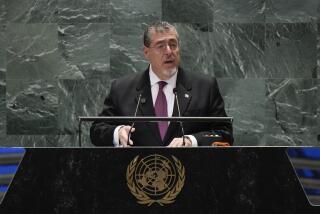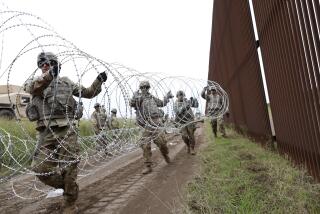800 Marines to Go to Panama for Training
WASHINGTON — The Pentagon announced Wednesday that it is sending 800 Marines to Panama for jungle training this week, but it insisted that the deployment is a routine exercise without connection to the ongoing U.S. effort to overthrow Panamanian strongman Manuel A. Noriega.
Meanwhile, Administration sources told The Times that an interagency group recommended to President Reagan new, tougher economic sanctions against Noriega. Under the proposal, Reagan would invoke the International Emergency Economic Powers Act to block any payments from American companies and individuals to the Noriega regime or any of its agencies.
The law has been invoked in the past only in extreme cases, involving Iran, Libya and Nicaragua. It would effectively cut off one of the last remaining sources of dollars for the regime, which has already had great difficulty meeting its payrolls.
The new Marine deployment will provide an additional U.S. military presence in Panama beyond the 1,300 troops that the Pentagon dispatched last Friday night to beef up security and the 10,000 troops already stationed in Panama at the U.S. Southern Command headquarters. A Pentagon spokesman said the Marines will arrive Friday at the U.S. Army Jungle Training Center at Ft. Sherman and will stay there for about three weeks.
“This has absolutely nothing to do with the security enhancement (in Panama),” said Pentagon spokesman Nancy LaLuntas. “These are three-week sessions that are normally run 14 times a year. It just happens to be time for a new unit to start their training.”
She acknowledged that because of budget cutbacks, the Marine unit from Camp Pendleton, Calif., is the first to be sent to the Jungle Training School from the United States since the beginning of this year.
The Pentagon’s announcement drew immediate criticism on Capitol Hill.
“I think there is a legitimate reason to send security forces to Panama as we did last week to protect American lives and property,” said Sen. Alan Cranston (D-Calif.). “But I think it’s excessive to send Marines down there for jungle training, as we did today. It’s obviously done to intimidate Gen. Noriega, and it’s playing with fire, because someone could get killed and then we would be in a position of being drawn into a shooting war.”
Sen. William S. Cohen (R-Me.), a member of the Senate Intelligence Committee, said he interpreted the dispatch of the Marines as a sign that the Administration is “increasing its military capabilities in the event that the military option has to be exercised” in Panama.
Last Friday, the Pentagon announced the first step-up in the U.S. military presence in Panama, a 1,300-troop deployment that consisted primarily of police forces and a helicopter task force. Those troops began arriving in Panama on Tuesday. U.S. officials maintain that their purpose is to protect American troops, their families and other U.S. citizens in Panama.
The Reagan Administration stepped up the military presence after the previous economic sanctions applied against Noriega failed to drive him from office.
A month ago, the Administration restricted the flow of U.S. dollars into Panama by certifying that the United States does not recognize the Noriega regime as Panama’s valid government. This action caused U.S. banks with deposits credited to the Panamanian government to hold onto the money, blocking the regime from access to it. Most Panamanian banks were forced to close because the nation’s economy is dollar-based.
Noriega’s regime countered by asking U.S. firms operating in Panama to pay taxes, landing fees and other costs in cash. Eastern Airlines, for example, paid the Noriega government about $175,000 in cash for landing fees. Texaco, which pays Panama about $9 million a month in sales taxes, also converted to cash operations. The money has allowed the regime to pay at least part of the salaries of its military.
Administration sources said that a Policy Review Group composed of representatives of the State, Defense, Treasury and Justice departments and the National Security Council met Tuesday afternoon and approved a recommendation for new sanctions that would halt this flow of dollars to Panama.
Their recommendation was that Reagan invoke the International Emergency Economic Power Act in a way that would freeze all payments by American firms or individuals to the Noriega regime. The new action would block all local tax payments by American firms, including cash payments.
The act gives the President broad power to restrict commercial dealings between the United States and another nation, whenever such action is justified by the needs of national security under emergency conditions.
Times staff writers Art Pine, Sara Fritz and Eric Lichtblau in Washington contributed to this story.
More to Read
Sign up for Essential California
The most important California stories and recommendations in your inbox every morning.
You may occasionally receive promotional content from the Los Angeles Times.









